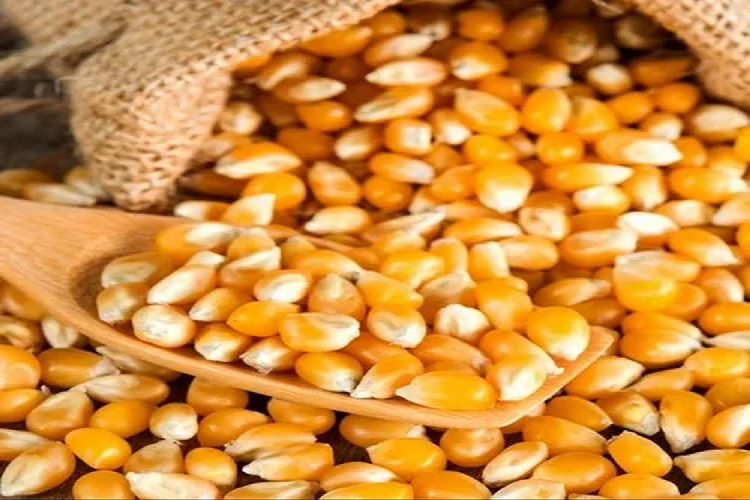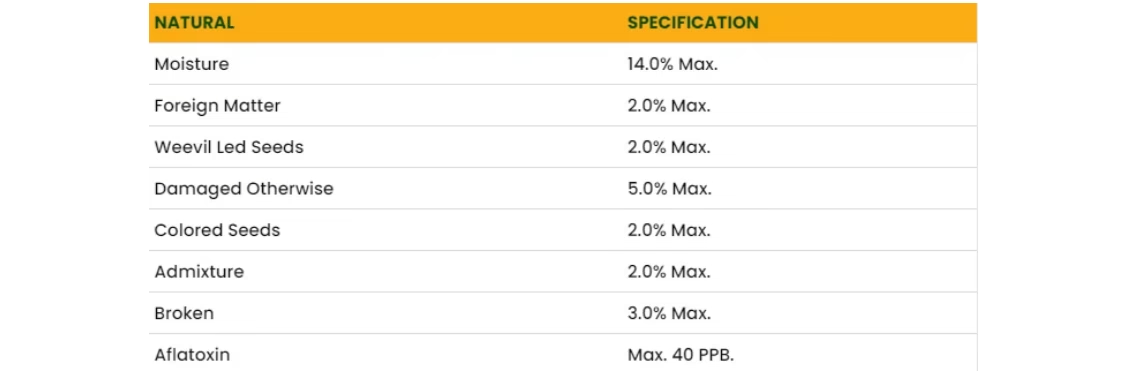
Welcome to Trans Group of Companies,
your trusted exporter of Pakistan Yellow Corn for Animal feed. Specialized in exports of Premium Quality to the Middle East and the Far East market. Explore our offerings to understand our commitment and why we are a leader in the global feed industry. Trust in our expertise.
PREMIUM QUALITY FOR FEED:
Yellow corn, a staple in animal feed, holds a prominent place in the agricultural industry due to its rich nutritional profile and widespread availability. As a primary feed ingredient, yellow corn is celebrated for its high carbohydrate content, which serves as a vital energy source for livestock. In addition to carbohydrates, yellow corn is also a significant provider of proteins and fiber, essential for the growth, health, and productivity of animals.
The importance of quality in feed ingredients cannot be overstated. High-quality yellow corn ensures that livestock receive consistent and adequate nutrition, leading to better overall health and improved productivity. Well-nourished animals tend to grow faster, have stronger immune systems, and are more efficient in converting feed into body mass. This, in turn, translates into higher yields for farmers and a more robust agricultural sector.
Moreover, the protein content in yellow corn is crucial for muscle development and repair in animals. Proteins are the building blocks of tissues, and their presence in adequate amounts ensures that livestock can develop and maintain strong muscles. Additionally, the fiber in yellow corn aids in digestion and promotes a healthy gut in animals, which is essential for optimal nutrient absorption and overall well-being.
In the context of animal feed, yellow corn’s nutritional benefits extend beyond energy, protein, and fiber. It also offers essential vitamins and minerals that contribute to the overall balance of the diet. These micronutrients play a role in various physiological functions, including metabolism, bone health, and reproductive performance.
In summary, yellow corn stands out as a superior feed ingredient that supports the health and productivity of livestock. Its comprehensive nutritional profile, combined with the importance of maintaining high-quality standards, underscores its value in animal feed formulations. As the demand for efficient and effective feed solutions continues to grow, yellow corn remains a cornerstone in the agricultural industry, ensuring the sustained well-being of livestock and the success of farmers worldwide.
Quality Standards of Pakistani Yellow Corn:
Pakistani yellow corn is renowned in the animal feed industry for its superior quality, adhering to stringent standards that ensure its premium status. One of the primary factors contributing to this high quality is the fertile soil found in Pakistan. The rich, nutrient-dense soil coupled with favorable climate conditions provides an ideal environment for cultivating yellow corn. These factors result in robust crops with high nutrient content, making them an excellent choice for animal feed.
In addition to natural conditions, meticulous farming practices play a crucial role in maintaining the quality of Pakistani yellow corn. Farmers in Pakistan employ advanced agricultural techniques and follow best practices to ensure that the corn meets industry standards. From the selection of high-quality seeds to the implementation of effective pest control measures, every step is taken with precision to produce top-grade corn.
The grading system for Pakistani yellow corn is another testament to its quality. The corn is carefully graded based on factors such as kernel size, color, and overall appearance. Only the highest quality kernels are selected for animal feed, ensuring that the final product is both nutritious and palatable for livestock.
Moisture content is a critical parameter in assessing the quality of yellow corn. Pakistani yellow corn is harvested and processed to maintain optimal moisture levels, typically ranging between 14% and 15%. This controlled moisture content helps preserve the corn’s nutritional value and prevents the growth of mold and other contaminants, which could be detrimental to animal health.
Moreover, Pakistani yellow corn is rigorously tested for the presence of aflatoxins, a group of toxins produced by certain fungi. The absence of these harmful contaminants is ensured through regular monitoring and adherence to strict quality control measures. This diligence in maintaining purity and safety standards makes Pakistani yellow corn a preferred choice for animal feed globally.
Benefits of Bulk Loading in Containers:
Bulk loading yellow corn into containers for export provides numerous logistical advantages that ensure the integrity and quality of the corn throughout its journey. One of the primary benefits is cost-effectiveness. By utilizing bulk containers, exporters can optimize space, reducing the number of shipments required and therefore lowering overall transportation costs. This method also minimizes the need for additional packaging materials, further cutting expenses and environmental impact.
Another significant advantage is the reduction in handling. When yellow corn is loaded in bulk, it is transferred directly from storage to the container, decreasing the number of touchpoints. This streamlined process not only speeds up loading and unloading times but also reduces the risk of damage and contamination. Each handling step introduces potential hazards, so limiting these steps helps maintain the corn’s quality.
Bulk containers are specifically designed to preserve the quality of agricultural products during transit. Standard types of containers used include intermodal containers and specialized grain containers. These containers are equipped with features such as ventilation systems and moisture control to protect the corn from environmental factors like humidity and temperature fluctuations. These measures are crucial in preventing spoilage and ensuring the corn arrives in optimal condition.
Additionally, by minimizing the risk of contamination, bulk loading in containers upholds the premium quality of the yellow corn. The sealed environment of the containers helps protect the corn from external contaminants such as pests, dust, and pollutants. This controlled environment is particularly important when transporting high-quality feed-grade corn that must meet stringent quality standards.
Overall, the practice of bulk-loading yellow corn into containers for export is a highly efficient and effective method. It not only ensures cost savings and operational efficiency but also plays a critical role in maintaining the integrity and quality of the corn from origin to destination.
Global Demand and Export Market for Pakistan Yellow Feed Corn:
The global demand for high-quality yellow corn has been on a consistent rise, driven by its extensive use in animal feed. Pakistani yellow corn, known for its premium quality, has successfully carved out a significant niche in the international market. Countries across Asia, the Middle East, and even parts of Europe have shown a growing preference for Pakistani yellow corn due to its rich nutritional profile and competitive pricing.
Key markets such as China, Vietnam, and the United Arab Emirates are among the top importers of Pakistani yellow corn. The factors driving this demand include the increasing need for animal feed in these regions, where livestock farming and poultry industries are expanding rapidly. The superior quality of Pakistani yellow corn, characterized by its high starch content and low levels of aflatoxins, meets the stringent quality standards required by these markets.
Statistics reflect a robust growth in the export of yellow corn from Pakistan. According to the Pakistan Bureau of Statistics, the country exported approximately 1.2 million metric tons of yellow corn in the last fiscal year, marking a year-on-year increase of 15%. This upward trend is indicative of Pakistan’s growing influence in the global corn trade.
Trade agreements and partnerships have further facilitated the international distribution of Pakistani yellow corn. For instance, the Pakistan-China Free Trade Agreement (FTA) has enabled easier access to one of the world’s largest markets. Additionally, Pakistan’s participation in the ASEAN Free Trade Area (AFTA) has opened up avenues for export to Southeast Asian nations with reduced tariffs, enhancing the competitiveness of Pakistani yellow corn.
The economic benefits for Pakistani farmers and the agricultural sector are substantial. The increasing export demand translates into higher incomes for farmers, encouraging them to adopt better farming practices and invest in improved agricultural technologies. This, in turn, boosts the overall productivity and sustainability of Pakistan’s agricultural sector.
We supply superior-quality Pakistani Yellow Maize, primarily used in the feed industry. Our maize is grown in the fertile soils of Pakistan, harvested with care, and processed under stringent quality control measures to ensure it meets the highest standards of quality and safety.
Our commitment to consistency, reliability, and customer satisfaction sets us apart. As dedicated maize suppliers, we understand the unique demands of the feed industry and strive to exceed these with our exceptional products. Our maize is not just a commodity. it’s a promise of quality, a testament to our agricultural heritage, and a product that has earned us a reputation as a trusted supplier in the global market.
Choose us for our premium product, professional service, and commitment to delivering the best Pakistani Yellow Maize for your needs.
SPECIFICATIONS
